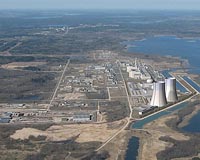 |
Seoul (AFP) March 7, 2010 South Korea, which has spent decades developing nuclear power to make up for its lack of oil, now hopes to become a global leader in atomic energy as the world turns away from fossil fuels. A Seoul-led consortium, triumphing over more experienced competitors, won a 20.4 billion dollar contract last December to build four nuclear plants in the United Arab Emirates. The deal will make South Korea the world's sixth exporter of reactors after the United States, France, Russia, Canada and Japan. It hopes to export 80 reactors worth 400 billion dollars by 2030. President Lee Myung-Bak has described atomic energy as a new growth engine. "Nuclear power is a great tool to make up for the lethal weakness of a country that does not produce a single drop of oil," he said in January. The industry guarantees huge benefits at relatively little cost and creates high-quality jobs, Lee said. But a growing radioactive waste stockpile which already amounts to 10,800 tonnes, coupled with a US ban on reprocessing, is fuelling uncertainty about the industry's future. Nuclear-armed neighbour North Korea is an added complication, along with Seoul's own atomic weapons research in previous decades. The United States fears that allowing the South to reprocess fuel could undermine efforts to denuclearise the North. The then-South Korean dictator Park Chung-Hee, under pressure from Washington, shut down a 1970s project to make nuclear weapons although there were isolated experiments after that. A 1974 nuclear cooperation accord with the US which expires in 2014 prevents South Korea from reprocessing fuel from civilian nuclear plants. But South Korea's recent export success has revived a debate about the need for "nuclear sovereignty". Local scientists say research into reprocessing and uranium enrichment will help them upgrade and export home-grown nuclear reactors and technology. "Washington, however, is reluctant to allow reprocessing in South Korea because of its past ambitions on nuclear bombs," Baek Seung-Joo of the Korea Institute for Defence Analyses told AFP. However, nuclear waste is becoming a pressing problem for an industry which generates 30 percent of the country's electricity. Temporary storage pools at 20 plants will be full by 2016 because the plants generate 700 tonnes of waste a year. Building a permanent storage facility deep underground would arouse fierce opposition in the small and densely populated nation. As a solution, the country's Atomic Energy Commission proposes pyroprocessing -- a technique to recycle spent fuel which does not produce weapons-grade plutonium. This would need US approval under the current deal. Officials at state-run Korea Hydro and Nuclear Power (KHNP) want the Seoul government to push for a new deal with Washington and not wait till 2014. Any US decision to let the South develop reprocessing or enrichment capabilities could have negative effects on negotiations with the North, said Scott Snyder, director of the Asia Foundation's Centre for US-Korea Policy. But US refusal to reach a new agreement "that fits with South Korea's emerging role" would clearly damage economic and political relations, he said in an article for the US Council on Foreign Relations. Snyder, citing Seoul's excellent safety record, urged it to focus on "nuclear responsibility" rather than nuclear sovereignty. KHNP prides itself both on safety and competitiveness -- saying it can supply a 1,400-megawatt reactor for export up to 30 percent cheaper than competitors. "We have top-class technology," Lee Soo-Il, one of its directors, told journalists on a tour last month of the country's first nuclear plant at Gori on the southeast coast. The complex has four plants, including the first one built in 1978 with French technology, and four more are under construction. Under current plans it will become the world's largest nuclear power site with 12 reactors by 2025. South Korea has set aside more than 90 million dollars to become fully independent of foreign atomic technology by the end of 2012.
Share This Article With Planet Earth
Related Links Nuclear Power News - Nuclear Science, Nuclear Technology Powering The World in the 21st Century at Energy-Daily.com
 France to host countries eager for nuclear energy
France to host countries eager for nuclear energyParis (AFP) March 5, 2010 Nations hungry for new energy sources gather next week in France, which sees a blooming market for its big nuclear energy companies but is also anxious to curb the spread of atomic weapons. In response to growing demand for renewable fuels, French President Nicolas Sarkozy will welcome delegates from Syria, former pariah Libya, and about 60 other countries on Monday for a two-day conference ... read more |
|
| The content herein, unless otherwise known to be public domain, are Copyright 1995-2010 - SpaceDaily. AFP and UPI Wire Stories are copyright Agence France-Presse and United Press International. ESA Portal Reports are copyright European Space Agency. All NASA sourced material is public domain. Additional copyrights may apply in whole or part to other bona fide parties. Advertising does not imply endorsement,agreement or approval of any opinions, statements or information provided by SpaceDaily on any Web page published or hosted by SpaceDaily. Privacy Statement |